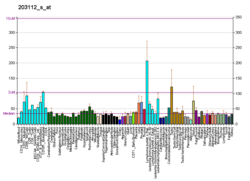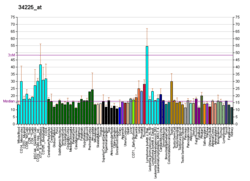WHSC2
Negative elongation factor A is a protein that in humans is encoded by the WHSC2 gene.[5][6]
Function
This gene is expressed ubiquitously with higher levels in fetal than in adult tissues. It encodes a protein sharing 93% sequence identity with the mouse protein. Wolf-Hirschhorn syndrome (WHS) is a malformation syndrome associated with a hemizygous deletion of the distal short arm of chromosome 4. This gene is mapped to the 165 kb WHS critical region, and may play a role in the phenotype of the WHS or Pitt-Rogers-Danks syndrome. The encoded protein is found to be capable of reacting with HLA-A2-restricted and tumor-specific cytotoxic T lymphocytes, suggesting a target for use in specific immunotherapy for a large number of cancer patients. This protein has also been shown to be a member of the NELF (negative elongation factor) protein complex that participates in the regulation of RNA polymerase II transcription elongation.[6] WHSC2 encodes the NELF-A subunit of the NELF complex.[7]
Interactions
WHSC2 has been shown to interact with RDBP.[7]
References
- 1 2 3 GRCh38: Ensembl release 89: ENSG00000185049 - Ensembl, May 2017
- 1 2 3 GRCm38: Ensembl release 89: ENSMUSG00000029111 - Ensembl, May 2017
- ↑ "Human PubMed Reference:".
- ↑ "Mouse PubMed Reference:".
- ↑ Wright TJ, Costa JL, Naranjo C, Francis-West P, Altherr MR (Jul 1999). "Comparative analysis of a novel gene from the Wolf-Hirschhorn/Pitt-Rogers-Danks syndrome critical region". Genomics. 59 (2): 203–12. PMID 10409432. doi:10.1006/geno.1999.5871.
- 1 2 "Entrez Gene: WHSC2 Wolf-Hirschhorn syndrome candidate 2".
- 1 2 Narita T, Yamaguchi Y, Yano K, Sugimoto S, Chanarat S, Wada T, Kim DK, Hasegawa J, Omori M, Inukai N, Endoh M, Yamada T, Handa H (Mar 2003). "Human transcription elongation factor NELF: identification of novel subunits and reconstitution of the functionally active complex". Molecular and Cellular Biology. 23 (6): 1863–73. PMC 149481
 . PMID 12612062. doi:10.1128/MCB.23.6.1863-1873.2003.
. PMID 12612062. doi:10.1128/MCB.23.6.1863-1873.2003.
Further reading
- Gutmajster E, Rokicka A (2003). "[Genetic determination of Wolf-Hirschhorn syndrome ]". Wiadomości Lekarskie. 55 (11-12): 706–10. PMID 12715353.
- Stevens M, De Clercq E, Balzarini J (Sep 2006). "The regulation of HIV-1 transcription: molecular targets for chemotherapeutic intervention". Medicinal Research Reviews. 26 (5): 595–625. PMID 16838299. doi:10.1002/med.20081.
- Maruyama K, Sugano S (Jan 1994). "Oligo-capping: a simple method to replace the cap structure of eukaryotic mRNAs with oligoribonucleotides". Gene. 138 (1-2): 171–4. PMID 8125298. doi:10.1016/0378-1119(94)90802-8.
- Andersson B, Wentland MA, Ricafrente JY, Liu W, Gibbs RA (Apr 1996). "A "double adaptor" method for improved shotgun library construction". Analytical Biochemistry. 236 (1): 107–13. PMID 8619474. doi:10.1006/abio.1996.0138.
- Wright TJ, Ricke DO, Denison K, Abmayr S, Cotter PD, Hirschhorn K, Keinänen M, McDonald-McGinn D, Somer M, Spinner N, Yang-Feng T, Zackai E, Altherr MR (Feb 1997). "A transcript map of the newly defined 165 kb Wolf-Hirschhorn syndrome critical region". Human Molecular Genetics. 6 (2): 317–24. PMID 9063753. doi:10.1093/hmg/6.2.317.
- Yu W, Andersson B, Worley KC, Muzny DM, Ding Y, Liu W, Ricafrente JY, Wentland MA, Lennon G, Gibbs RA (Apr 1997). "Large-scale concatenation cDNA sequencing". Genome Research. 7 (4): 353–8. PMC 139146
 . PMID 9110174. doi:10.1101/gr.7.4.353.
. PMID 9110174. doi:10.1101/gr.7.4.353. - Suzuki Y, Yoshitomo-Nakagawa K, Maruyama K, Suyama A, Sugano S (Oct 1997). "Construction and characterization of a full length-enriched and a 5'-end-enriched cDNA library". Gene. 200 (1-2): 149–56. PMID 9373149. doi:10.1016/S0378-1119(97)00411-3.
- Yamaguchi Y, Takagi T, Wada T, Yano K, Furuya A, Sugimoto S, Hasegawa J, Handa H (Apr 1999). "NELF, a multisubunit complex containing RD, cooperates with DSIF to repress RNA polymerase II elongation". Cell. 97 (1): 41–51. PMID 10199401. doi:10.1016/S0092-8674(00)80713-8.
- Ping YH, Rana TM (Apr 2001). "DSIF and NELF interact with RNA polymerase II elongation complex and HIV-1 Tat stimulates P-TEFb-mediated phosphorylation of RNA polymerase II and DSIF during transcription elongation". The Journal of Biological Chemistry. 276 (16): 12951–8. PMID 11112772. doi:10.1074/jbc.M006130200.
- Mariotti M, Manganini M, Maier JA (Dec 2000). "Modulation of WHSC2 expression in human endothelial cells". FEBS Letters. 487 (2): 166–70. PMID 11150502. doi:10.1016/S0014-5793(00)02335-8.
- Ito M, Shichijo S, Tsuda N, Ochi M, Harashima N, Saito N, Itoh K (Mar 2001). "Molecular basis of T cell-mediated recognition of pancreatic cancer cells". Cancer Research. 61 (5): 2038–46. PMID 11280764.
- Yamaguchi Y, Filipovska J, Yano K, Furuya A, Inukai N, Narita T, Wada T, Sugimoto S, Konarska MM, Handa H (Jul 2001). "Stimulation of RNA polymerase II elongation by hepatitis delta antigen". Science. 293 (5527): 124–7. PMID 11387440. doi:10.1126/science.1057925.
- Yamaguchi Y, Inukai N, Narita T, Wada T, Handa H (May 2002). "Evidence that negative elongation factor represses transcription elongation through binding to a DRB sensitivity-inducing factor/RNA polymerase II complex and RNA". Molecular and Cellular Biology. 22 (9): 2918–27. PMC 133766
 . PMID 11940650. doi:10.1128/MCB.22.9.2918-2927.2002.
. PMID 11940650. doi:10.1128/MCB.22.9.2918-2927.2002. - Zollino M, Lecce R, Fischetto R, Murdolo M, Faravelli F, Selicorni A, Buttè C, Memo L, Capovilla G, Neri G (Mar 2003). "Mapping the Wolf-Hirschhorn syndrome phenotype outside the currently accepted WHS critical region and defining a new critical region, WHSCR-2". American Journal of Human Genetics. 72 (3): 590–7. PMC 1180235
 . PMID 12563561. doi:10.1086/367925.
. PMID 12563561. doi:10.1086/367925. - Narita T, Yamaguchi Y, Yano K, Sugimoto S, Chanarat S, Wada T, Kim DK, Hasegawa J, Omori M, Inukai N, Endoh M, Yamada T, Handa H (Mar 2003). "Human transcription elongation factor NELF: identification of novel subunits and reconstitution of the functionally active complex". Molecular and Cellular Biology. 23 (6): 1863–73. PMC 149481
 . PMID 12612062. doi:10.1128/MCB.23.6.1863-1873.2003.
. PMID 12612062. doi:10.1128/MCB.23.6.1863-1873.2003. - Beausoleil SA, Jedrychowski M, Schwartz D, Elias JE, Villén J, Li J, Cohn MA, Cantley LC, Gygi SP (Aug 2004). "Large-scale characterization of HeLa cell nuclear phosphoproteins". Proceedings of the National Academy of Sciences of the United States of America. 101 (33): 12130–5. PMC 514446
 . PMID 15302935. doi:10.1073/pnas.0404720101.
. PMID 15302935. doi:10.1073/pnas.0404720101.





